
You are here
- Home
- Writing Funny - language, creativity and comedy
Writing Funny - language, creativity and comedy
- Dates
- Tuesday, October 1, 2013 - 14:00 to Wednesday, December 25, 2013 - 19:30
October - December 2013
What makes something funny? Why do jokes work some times and not at other times? How is writing comedy different from performing comedy? What is the role of culture in comedy?
Here is the downloadable flyer for the series [PDF, 236 KB ].
This seminar series will look at the language and creativity involved in writing and performing comedy and will seek to explore possible answers to these (and other) questions.
Each event will include two speakers: a comedy ‘practitioner’ and a respondent from an academic approach to comedy and comic writing.
The seminars are free and are on Tuesdays from 17.30 – 19.30 from the end of October to the middle of December 2013. All seminars will be at Senate House, University of London, Malet Street, London - Venue map for Senate House.
Seminar 1 – Situation Comedy – creativity in writing and performance
October 29, 2013 in Senate House, The Senate Room (First Floor)
The sitcom is one of the most established genres of Anglo-Saxon comedy. In this session we will discuss why this might be the case (what is special about writing sitcoms?) and what consequences this might have for the writing and performing of new material (how can you be creative?). We will also explore the role of language vs. the situation vs. other sources of humour in this setting to ask, ‘what comes first, the situation or the comedy?’
Speakers: Dan Berlinka, Brian Dooley and Brett Mills (University of East Anglia)
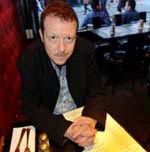
Dan Berlinka is a BAFTA award-winning and Writers’ Guild Award-nominated writer/producer with over 15 years experience in television in the UK and US. Dan studied English at Cambridge and Cinema at New York University, after which he began a television career during which he has worked with TV companies such as Sky, Disney, Channel 4, ITV, the BBC and even the World Wrestling Federation (!).
Dan has written scripts for numerous children’s comedy series including Shaun the Sheep, Horrid Henry, The 4 O’Clock Club and Dani’s Castle. He also has several “grown up” sitcoms in development, the most recent of which, Icebreakers, was recently optioned by the makers of My Family, DLT Entertainment.
Brian Dooley has worked in comedy as a writer, script editor and associate producer. He is best known for creating and writing The Smoking Room, which won a BAFTA in 2005. Other credits include Monkey Dust, Being Human and Way To Go as well as plays for Radio 4.
Brett Mills is a Senior Lecturer in Film and Television Studies at the University of East Anglia, and has previously worked at Glamorgan University, the Open University and Leicester University. He is the author of Television Sitcom (British Film Institute, 2005) and The Sitcom (Edinburgh University Press, 2009), and co-author of two editions of Reading Media Theory: Thinkers, Approaches, Contexts (Pearson Education, 2009/2013).
He has researched television comedy since writing his undergraduate dissertation on One Foot in the Grave. He is currently undertaking the three-year (2012-14) Arts and Humanities Research Council-funded research project, 'Make Me Laugh: Creativity in the British Television Comedy Industry' (www.makemelaugh.org.uk) where he is working with comedy writers, producers and commissioners to explore the creative process, the relationships between creative workers and the television industry, and the factors that help and hinder comedy production.
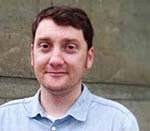
Seminar 2 – Lost in Translation? – comedy across cultures
November 19, 2013 in Senate House, Room 349 (3rd floor)
Most people have personal experience of the role of culture in humour. Minimally, cultural differences can be a source of humour, or can influence the translation and understanding of humour. This session will explore questions such as: How does humour translate (or not) and does it matter whether it is written or spoken? Where is the line between humour and stereotyping or racism and is it easier to walk it in performance or writing? Does humour reflect or shape the ideology of the age?
Speakers: James Robson (Open University) and Helen Eastman
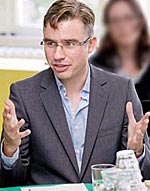
James Robson is Senior Lecturer and Head of Department of Classical Studies at the Open University. His research centres on the classical Greek comic playwright Aristophanes, in particular the humour, obscenity and sexuality of the plays and their translation into English.
His publications include Aristophanes: An Introduction (shortlisted for the Anglo-Hellenic League’s Runciman Award; Duckworth, 2009) and Humour, Obscenity and Aristophanes (Narr, 2006). James' current book projects include Sex and Sexuality in Classical Athens (Edinburgh University Press) and the co-editorship of Sex in Antiquity (Routledge).
Helen Eastman is a director and writer of theatre and opera. She trained at LAMDA after graduating from Oxford University in Classics and English with the Passmore Edwards Prize. She has just directed the 2013 Cambridge Greek plays (Prometheus and The Frogs) and in 2010 directed their Agamemnon. Helen is Artistic Director of Live Canon, for whom she has created theatre and site specific shows, installations and digital performances throughout the UK. She was one of 12 women invited to create work in the Phenomenal People series at the Festival Hall. She was Producer of the Oxford University Onassis Programme from 2005 to 2011 commissioning new theatre, opera and dance inspired by Ancient Drama.
She is Associate Artist of Oxford University’s APGRD. As a playwright and librettist she has written plays and operas for Oxford Playhouse, The Royal Society, Sheffield Crucible, Queens Hornchurch, Greenwich Theatre, Chester Open Air Season, ETO and the Young Vic, and translated opera, poetry and drama. Directing highlights include Circus Etc (The De La Warr Pavilion), Wild Raspberries (Citizens Theatre, Glasgow), Bug Off (OTC Dublin and tour), Cure at Troy (Delphi International Festival and Tour), Bridgetower (Hackney Empire and Tour), Dido and Aeneas (National Tour for English Touring Opera), Speakout (Queen's Theatre, Hornchurch for English Touring Opera), Splat (Greenwich Theatre), Felt Effects (Theatre503), Hansel and Gretel (Cork Opera House), The Sweet Science of Bruising (National Theatre Studio), Cloudcuckooland, nominated for a Total Theatre Award (International Tour), Pots and Plays (site specific at Ashmolean Museum), Dear Father Christmas, Where’s Father Christmas, Bicycle Boy (Oxford Playhouse), Dusa, Stas, Fish and Vi, The Monument, The Gabriels (Finborough Theatre).
She is currently collaborating with Glyn Maxwell on a new piece of work. elen Eastman photo (c) John Watts.
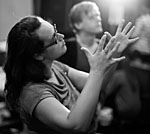
Seminar 3 – Comedy Live – creativity in stand up
December 10, 2013 in Senate House, Chancellor’s Hall (1st floor)
Stand-up is a special form of comedy as it involves the audience perhaps more than any other genre. In this session we will explore the nature of stand-up versus other forms of comedy. Questions will also focus on the role of writing in stand-up, how the audience can be accounted for in the writing process, and how the written piece might be different from the performed piece.
Speakers: Sindhu V and Lisa Moore (University of Salford)

Sindhu V is a stand up comedian who in 2013 was a finalist for the Funnywomen UK Awards. The Awards are a benchmark for women breaking into comedy, nurturing female talents such as Bridget Christie, Kerry Godliman, Sara Pascoe, Zoe Lyons and Holly Walsh as well as the hugely successful Sarah Millican to name a few.
Born and brought up in the India, Sindhu has degrees from Delhi University (Political Science), Oxford University (PPE), McGill University (Politics) and the University of Chicago (Public Policy).
After a career in investment banking in London Sindhu went on to set up an online ethical luxury fashion boutique called DeviDoll.com in 2006. Chosen by the Ecologist as one of the eleven most influential women in ethical and sustainable fashion in the UK, she was invited to join the Ethical Fashion Forum and was a judge on the panel for Esthetica, the sustainable section London Fashion Week. During this period she also wrote a blog called ‘Curate Your Consumption’, about the whys and hows of sustainable fashion. Alongside this Sindhu has been on the Advisory Board of Room To Read since 2007. Room to Read is an NGO dedicated to improving literacy and gender equality in children’s education in the developing world.
After enrolling in a 4-hour ‘Are Women Funny’ workshop in early 2012, Sindhu qualified for the heats of The Funny Women Awards UK. This was her first ever stand-up performance and she became a semi-finalist. In August 2012 she was invited to perform at the Edinburgh Fringe. Since October 2012 Sindhu V. has been gigging all over London including ‘One's To Watch’ London Nights Comedy at Leicester Square Theater, International Women’s Day Eve – 10 Nations Charity Gala, The Million Women Rising After Party. She had her first gig in India in June 2013 and also performed at the Edinburgh Fringe this year in the Amused Moose Gangshow. Most recently Sindhu performed to a 400 strong audience at Leicester Square Theatre for the Funnywomen UK Final.
Lisa Moore has a background in acting with roles including Coronation Street, Doctors, Playing the field, Emmerdale, Heart Beat, BBC radio 4 productions and several theatre roles. She studied Drama at Manchester University and has a Masters degree in scriptwriting for TV and Radio from the University of Salford. Her main research area is theatre as a social, political and educational tool.
She has a long history of involvement with both TIPP (Theatre in Prisons and Probation) and The Blue Room (men who are at risk of sexual exploitation). Lisa’s current research interests are in the field of comedy. Her PhD The funny thing about women is partly an investigation into the changing face of female stand-up comedy in Britain. Her research will attempt to address some of the questions around audience expectations of women in comedy as well as examining the different gender approaches involved in the writing and execution of stand-up comedy.
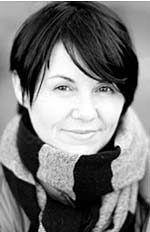
For any queries regarding this seminar series, please contact the series convenor, Zsófia Demjén (zsofia.demjen@open.ac.uk), Centre for Language and Communication, The Open University.
This is part of a series of seminars organized by the OU’s Contemporary Cultures of Writing Research Group in collaboration with the Institute of English Studies, UL.
Contact Us
Contact us by email:
CCWritingOU@open.ac.uk
The Postal Address is:
Department of English and Creative Writing
The Open University
Walton Hall
Milton Keynes
MK7 6AA
Tel +44-1908-652092